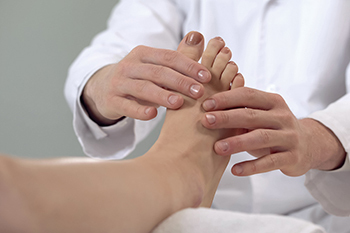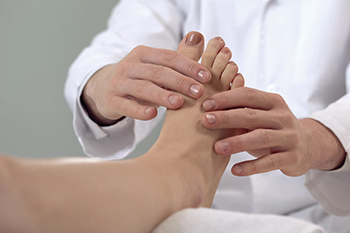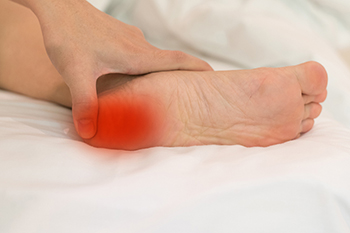Connect With Us
Blog
Items filtered by date: September 2022
Surgery May Be Necessary for People Who Have Flat Feet

Research has shown the foot condition that is known as flat feet affects approximately one quarter of people worldwide. The medical term for this ailment is referred to as pes planus, and it is noticeable as the foot lies flat on the floor while standing. Many people are affected by this foot condition, and it may cause difficulty in walking. Additionally, there are people who can accomplish daily activities without having pain, and it does not affect their lives. The majority of babies are born with flat feet, and the arch generally develops by the teenage years. Adults who continue to have flat feet may consider having reconstruction surgery performed, and this can be effective in strengthening the arch. The ligaments, tendons and bone structure may be negatively affected in people who have flat feet, and surgery may be successful in repairing this part of the foot. If you have this foot condition, it is suggested that you are under the care of a podiatrist who can guide you toward options that can provide relief.
Foot surgery is sometimes necessary to treat a foot ailment. To learn more, contact one of our podiatrists of New England Foot and Ankle. Our doctors will assist you with all of your foot and ankle needs.
When Is Surgery Necessary?
Foot and ankle surgery is generally reserved for cases in which less invasive, conservative procedures have failed to alleviate the problem. Some of the cases in which surgery may be necessary include:
- Removing foot deformities like bunions and bone spurs
- Severe arthritis that has caused bone issues
- Cosmetic reconstruction
What Types of Surgery Are There?
The type of surgery you receive will depend on the nature of the problem you have. Some of the possible surgeries include:
- Bunionectomy for painful bunions
- Surgical fusion for realignment of bones
- Neuropathy decompression surgery to treat nerve damage
Benefits of Surgery
Although surgery is usually a last resort, it can provide more complete pain relief compared to non-surgical methods and may allow you to finally resume full activity.
Surgical techniques have also become increasingly sophisticated. Techniques like endoscopic surgery allow for smaller incisions and faster recovery times.
If you have any questions please feel free to contact one of our offices located in Chelmsford and Newburyport, MA . We offer the newest diagnostic and treatment technologies for all your foot and ankle needs.
Arthritis Can Cause Pain in the Feet and Ankles
Places to Wear Flip Flops

Flip-flops are a popular type of shoes that are worn during the summer months. They can be purchased in a variety of colors and styles, and are easy to wear. They are generally inexpensive to buy and can be fun to wear. Despite the appeal, these types of shoes may not be beneficial for the health of the feet. Flip-flops often have little or no arch support and the entire foot can be negatively affected. The toes often grip harder than they should to keep the shoes on the feet. They are appropriate to wear for short periods such as in public showers or locker rooms, and to the beach. When other activities are performed, it is suggested that sturdier shoes are worn that can better protect the feet. For more information about how the feet can be affected by wearing flip-flops, please consult with a podiatrist.
Flip-flops can cause a lot of problems for your feet. If you have any concerns about your feet or ankles, contact one of our podiatrists from New England Foot and Ankle. Our doctors will assist you with all of your foot and ankle needs.
Flip-Flops and Feet
Flip-flops have managed to become a summer essential for a lot of people. While the shoes may be stylish and easy to slip on and off, they can be dangerous to those who wear them too often. These shoes might protect you from fungal infections such as athlete’s foot, but they can also give you foot pain and sprained ankles if you trip while wearing them.
When Are They Okay to Wear?
Flip-flops should only be worn for very short periods of time. They can help protect your feet in places that are crawling with fungi, such as gym locker rooms. Athlete’s foot and plantar warts are two common fungi that flip-flops may help protect your feet against.
Why Are They Bad for My Feet?
These shoes do not offer any arch support, so they are not ideal for everyday use. They also do not provide shock absorption or heel cushioning which can be problematic for your feet. Additionally, you may suffer from glass cuts, puncture wounds, and stubbed toes since they offer little protection for your feet.
More Reasons Why They Are Bad for Your Feet
- They Slow You Down
- May Cause Blisters and Calluses
- Expose Your Feet to Bacteria
If you have any questions, please feel free to contact one of our offices located in Chelmsford and Newburyport, MA . We offer the newest diagnostic and treatment technologies for all your foot care needs.
Why a Bunion Develops and What to Do About It

A bunion, known as hallux valgus, is a bony bump that occurs on the joint of the big toe. It forms from bones in the top part of the foot moving out of place, which causes the tip of the big toe to be pulled toward the smaller toes. It also forces the joint in the big toe to be stuck. Women and elderly people are most apt to suffer with bunions. These rarely occur in children, but sometimes babies are born with bunions, or they form in later childhood. The skin above the bunion might be sore and red. Bunions can form by wearing narrow or tight shoes, from one’s foot shape, way of walking, a medical condition, or a foot deformity. Calluses might develop where the big and 2nd toe touch, or on the ball of the foot. Bunion pads, well-fitted shoes, or toe spacers might help with bunion discomfort, and if not, bunion surgery (a bunionectomy) might be an option. Untreated bunions may get worse over time, and it might be difficult to walk or wear regular shoes without pain. If you have a bunion and it hurts, contact a podiatrist for the best treatment option for you.
If you are suffering from bunions, contact one of our podiatrists of New England Foot and Ankle. Our doctors can provide the care you need to keep you pain-free and on your feet.
What Is a Bunion?
A bunion is formed of swollen tissue or an enlargement of boney growth, usually located at the base joint of the toe that connects to the foot. The swelling occurs due to the bones in the big toe shifting inward, which impacts the other toes of the foot. This causes the area around the base of the big toe to become inflamed and painful.
Why Do Bunions Form?
Genetics – Susceptibility to bunions are often hereditary
Stress on the feet – Poorly fitted and uncomfortable footwear that places stress on feet, such as heels, can worsen existing bunions
How Are Bunions Diagnosed?
Doctors often perform two tests – blood tests and x-rays – when trying to diagnose bunions, especially in the early stages of development. Blood tests help determine if the foot pain is being caused by something else, such as arthritis, while x-rays provide a clear picture of your bone structure to your doctor.
How Are Bunions Treated?
- Refrain from wearing heels or similar shoes that cause discomfort
- Select wider shoes that can provide more comfort and reduce pain
- Anti-inflammatory and pain management drugs
- Orthotics or foot inserts
- Surgery
If you have any questions, please feel free to contact one of our offices located in Chelmsford and Newburyport, MA . We offer the newest diagnostic and treatment technologies for all your foot care needs.
What Causes Heel Pain?

There are many causes of heel pain. Heel pain is often caused by plantar fasciitis, which is an inflammation of the connective tissue that spans the sole of the foot—from the heel bone through the arch up into the forefoot. Heel spurs, which are calcium deposits that form on the heel bone in response to repeated trauma, can sometimes cause heel pain as well. Oftentimes, these two conditions occur at the same time. People may be more at risk of developing heel pain if they are overweight, which puts undue stress and tension on the plantar fascia. Overusing the plantar fascia may also contribute to plantar fasciitis, as well as having tight calf muscles or wearing improper footwear that does not offer adequate support. If you have any heel pain, see a podiatrist who can diagnose and help to remedy this condition.
Many people suffer from bouts of heel pain. For more information, contact one of our podiatrists of New England Foot and Ankle. Our doctors can provide the care you need to keep you pain-free and on your feet.
Causes of Heel Pain
Heel pain is often associated with plantar fasciitis. The plantar fascia is a band of tissues that extends along the bottom of the foot. A rip or tear in this ligament can cause inflammation of the tissue.
Achilles tendonitis is another cause of heel pain. Inflammation of the Achilles tendon will cause pain from fractures and muscle tearing. Lack of flexibility is also another symptom.
Heel spurs are another cause of pain. When the tissues of the plantar fascia undergo a great deal of stress, it can lead to ligament separation from the heel bone, causing heel spurs.
Why Might Heel Pain Occur?
- Wearing ill-fitting shoes
- Wearing non-supportive shoes
- Weight change
- Excessive running
Treatments
Heel pain should be treated as soon as possible for immediate results. Keeping your feet in a stress-free environment will help. If you suffer from Achilles tendonitis or plantar fasciitis, applying ice will reduce the swelling. Stretching before an exercise like running will help the muscles. Using all these tips will help make heel pain a condition of the past.
If you have any questions please contact one of our offices located in Chelmsford and Newburyport, MA . We offer the newest diagnostic and treatment technologies for all your foot and ankle needs.
Gout Pain Can Be Managed
Blog Archives
- April 2025
- March 2025
- February 2025
- January 2025
- December 2024
- November 2024
- October 2024
- September 2024
- August 2024
- July 2024
- June 2024
- May 2024
- April 2024
- March 2024
- February 2024
- January 2024
- December 2023
- November 2023
- October 2023
- September 2023
- August 2023
- July 2023
- June 2023
- May 2023
- April 2023
- March 2023
- February 2023
- January 2023
- December 2022
- November 2022
- October 2022
- September 2022
- August 2022
- July 2022
- June 2022
- May 2022
- April 2022
- March 2022
- February 2022
- January 2022
- December 2021
- November 2021
- October 2021
- September 2021
- August 2021
- July 2021
- June 2021
- May 2021
- April 2021
- March 2021
- February 2021
- January 2021
- December 2020
- November 2020
- October 2020
- September 2020
- August 2020
- July 2020
- June 2020
- May 2020
- April 2020
- March 2020
- February 2020
- January 2020
- December 2019
- November 2019
- October 2019
- September 2019
- August 2019
- July 2019
- June 2019
- May 2019
- April 2019
- March 2019
- February 2019
- January 2019
- December 2018
- November 2018
- October 2018
- September 2018
- August 2018
- July 2018
- June 2018
- May 2018
- April 2018
- March 2018
- February 2018
- January 2018
- December 2017
- November 2017
- October 2017
- September 2017
- August 2017
- July 2017
- June 2017
- May 2017
- April 2017
- March 2017
- February 2017
- March 2016


